2023 would be my first year at AfrikaBurn.
A friend told me about the creative grants that AfrikaBurn gives to artists and collectives wishing to showcase their artworks at the Burn. I wondered what I could submit that would speak to the work we do which is the u-khai (lifting of up) of /ari (erased) Khoikhoi First nation narratives in South Africa and the sharing of the language of our aboxan (ancestors), Khoikhoi, a First language of these lands, the clicks of Sarah Baartman, one of the worlds most recognised African woman, the words that gives meaning to Tankwa Karoo.
As Khoikhoi First Nation communities in post-apartheid South Africa, we still exist on the outskirts, in the shadows of the South African cultural //gams (conversations), assimilated into a Coloured racial classification, with very little knowledge that our ancestral language is still spoken in parts of the Northern Cape and in Namibia.
As Khoi people, we thought that 1994 would see a miǂui (acknowledgement) of what was taken away and that we would see a narrative of /asa/asa (restoration). Sadly, it would be Khoikhoi person who would continue to be the most likely to end up in prison, to live on a Sassa government support grant and more likely to be unhoused, very similar to the plight of Indigenous communities across the world.
Khoi work for me has been to ǂaiho (to remember) that I do come from a great people, the oananoagus (child) of a Khoi mother from the Inqua Khoikhoi people of Kamdeboo or Graaff-Reinet, in the Eastern Cape.
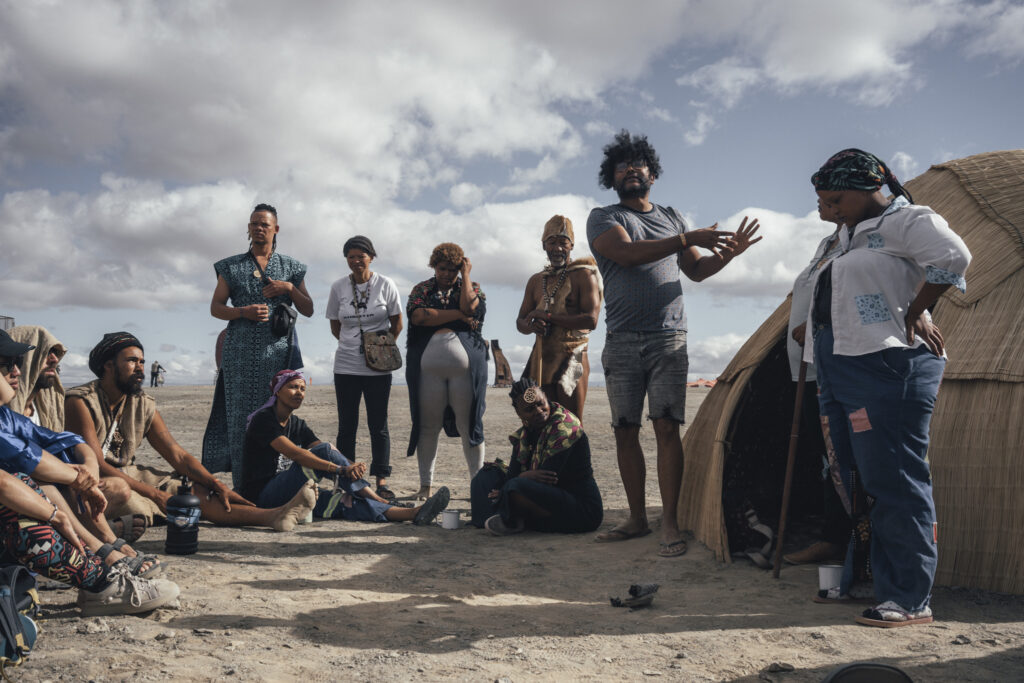
How was our kurus (artwork) going to kare (praise) our Khoikhoi aboxan (ancestors) whilst still creating //gams (conversations) about our challenges?
And suddenly just a lightbulb moment. Why not take a !hara-oms (matjieshuis) to the burn. This Khoikhoi architectural greatness built entirely of eco-sustainable materials, easy to construct with minimal damage to the environment, a structure that lived on these lands for thousands of years, made of reeds that expand in the summer allowing cool air to travel inside and in winter swells up, keeping the hot air inside.
To me it seemed like an easy task but the construction of the !hara-oms (matjieshuis) is one of those Khoikhoi Indigenous knowledge practises that was almost erased from our Khoikhoi people but I also knew that the aboxan (ancestors) would not give me this ǂais (idea) if they were not going guide me on this daos (journey).
How !gai (great) it was receive a call from Isa at AfrikaBurn, she who became such an important part of our AfrikaBurn journey, that we would be supported with a creative grant.
I have been to the Nama Khoi festival in Namibia and I have seen auma Katrina Katjito building a matjieshuis but where would I find that knowledge to build the !hara-oms closer to home. I almost forgot about my horesab (friend) Geralt Cloete, theatre maker and director of the Nama Khoi productions, a theatre company based in the Richtersveld, in the Northern Cape.
Geralt whose father still speaks fluent Khoikhoi, who reminded me that in the Richtersveld, Khoi elders still now how to built both the matjies for the matjieshuis and how to construct a matjieshuis.
It would be antie Frieda, a Nama Khoi elder who would guide Geralt and the team from the Richtersveld, so amazingly with this process. Antie Frieda, who was raised in a matjieshuis and still speak the Khoikhoi gowas or language.
I remembered getting of the bus at Tanwka Karoo and not being able to find our group from the Richtersveld. They arrived a few days earlier to build the matjieshuis but seeing it from a distance on the landscape, seeing that which belongs to our Khoi people, brought me so much ǂnisa (pride), such a profound sense of ǃgaiaǂgaob (joy). It left me nai. Now you may think that nai is a swear word but actually in Khoikhoi it means to be speechless and witnessing the isa (beauty) of our !hara-oms (matjieshuis) left me speechless.
Still, I didn’t know what to expect from AfrikaBurn. Would we only be doing our daily visits to our !hara-oms, share with people some Khoikhoi words and return back to our tents waiting for tomorrow’s session?
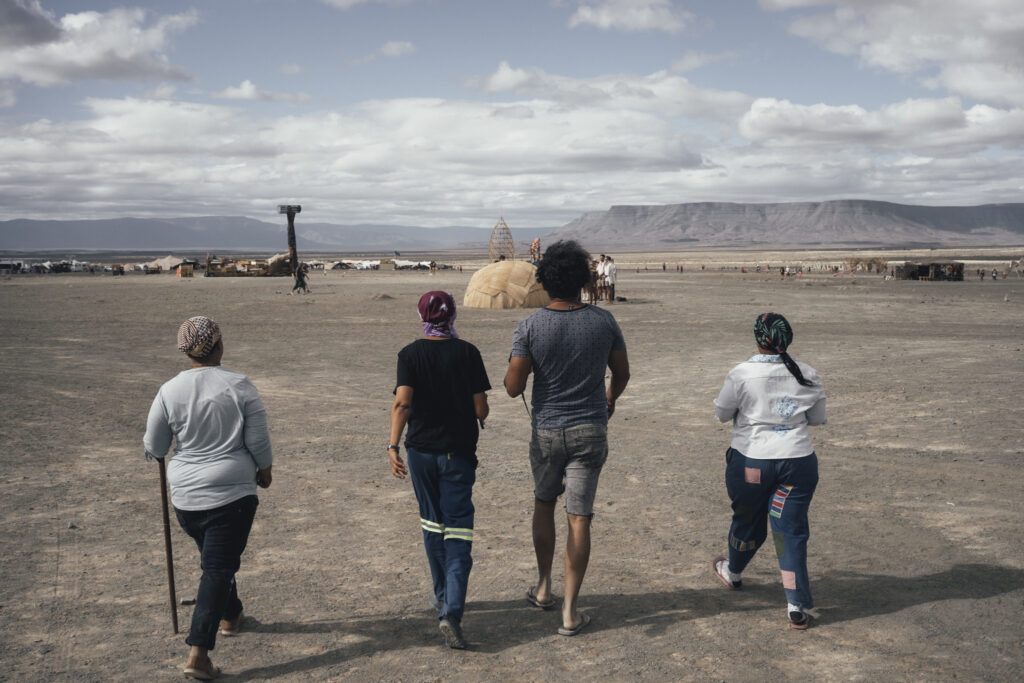
I also felt the excitement from fellow burners as we left Cape Town to Tankwa but what I really didn’t anticipate was that there would be no cell phone signal. Getting to Tankwa and seeing the matjieshuis, I knew that indeed my group was on this massive stretch of land but how would I find them?
Fortunately, there was a Khoi elder who knew exactly who I was looking for and quickly reunited me with our group. I found our group a bit saddened as they had some differences with some people but our elder, who showed me their camp, told us that there was also this other space, a vegan camp, and that they offered to host us.
We eventually moved to Ryan and his amazing group of Burners, a most generous group of people at the the vegan camp but oh it was then that our Burn truly started to burn, in the best way possible. Having the most buruxa //gams (amazing conversations) with people from all over the world showing such genuine interest in the /garubes (stories) of our Khoikhoi people and wanting to know how they could kaikai (amplify) our work.
What a sight too also witness the landscape change to this magical playground of lights, sounds and how we were a bit envious that we didn’t get the memo that Tankwa was also where you could unapologetically wear the brightest and most outrageous costumes.
How buruxa (amazing) also to share with the many people we met that the words Tankwa Karoo in Khoikhoi is Tan to ‘warm up at a fire’ kwa means ‘people or group’ and wasn’t that exactly what we were doing in the desert heat, a physical and spiritual warming up groups but also that Karoo is ‘dry place’ and you would alway see the deeper connection and the gangans (appreciation) for sharing both our language and the lands of our Khoi aboxan (ancestors).
Tankwa Karoo was such a therapeutic space and there was something buruxa (amazing) about standing in line for a glass of wine whilst also receiving some soup, with random people hugging each and just being as close to their authentic self as possible.
The last few days were really some of the best days and as much as we were excited to see our loved ones and share all these amazing stories, there was also this strange mourning for a place that became home. All the memories, all the beautiful faces, the different languages and voices that we would now leave behind.
Also thinking what if the ‘real’ world could be like AfrikaBurn, what if we could all just be free to love ourselves, without the fear of being judged, ridiculed or ignored.
But as we left the Burn and looked over the landscape, already thinking of our return in 2024, to bring more !hara-oms (matjieshuis), Khoikhoi music, exhibitions, dancers and our traditional foods to the burn, we also knew that we were not the same people who came to the Burn.
Khoikhoi is not just a name of people but also a ǂais (idealogy) that reminds us that we are only a people because of other people and no where else was that as visible as at the Burn.
Kaise Kai gangan (thank you) to everyone who made our first burn so buruxa (amazing).
By Toroga Denver

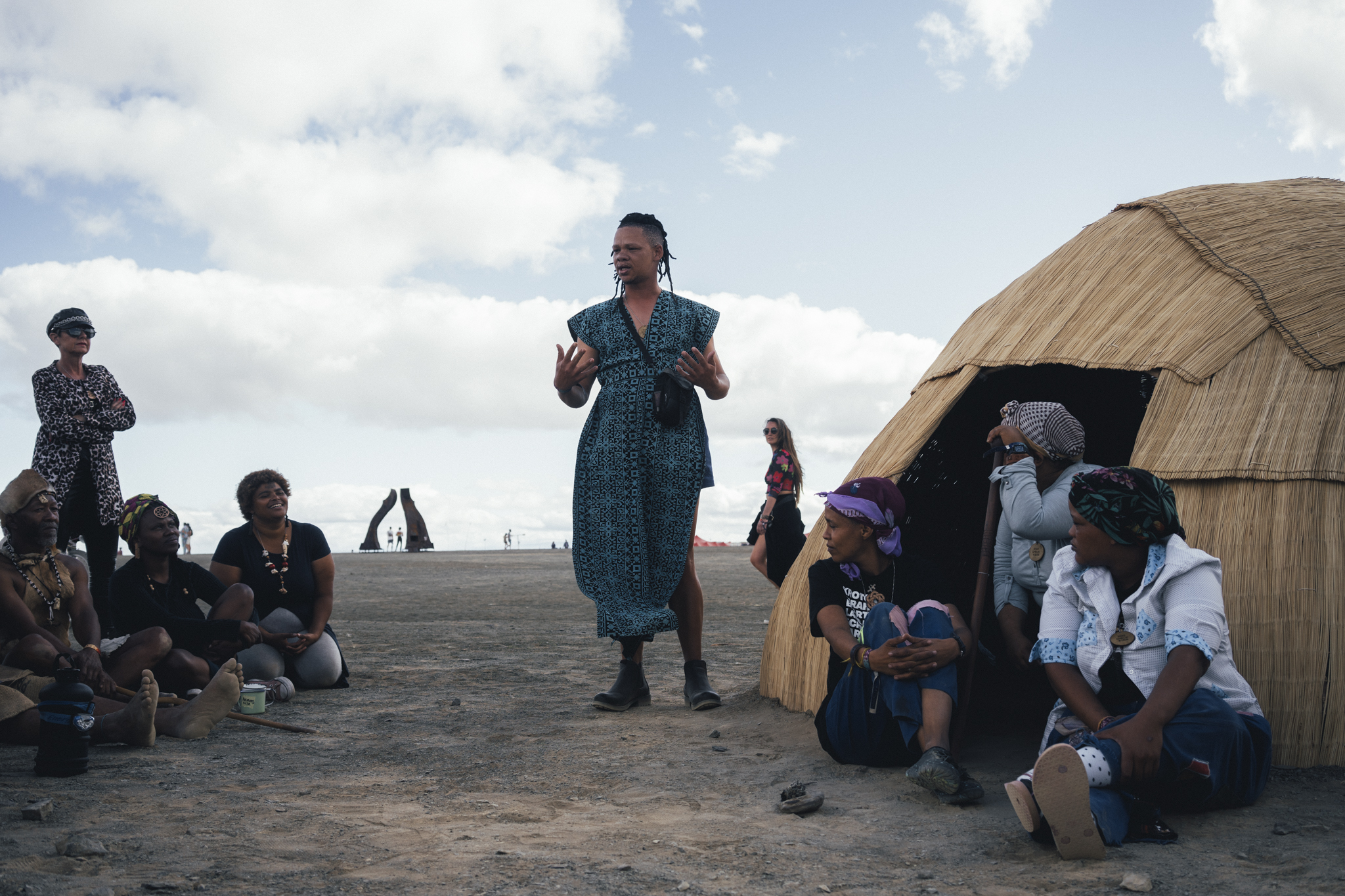

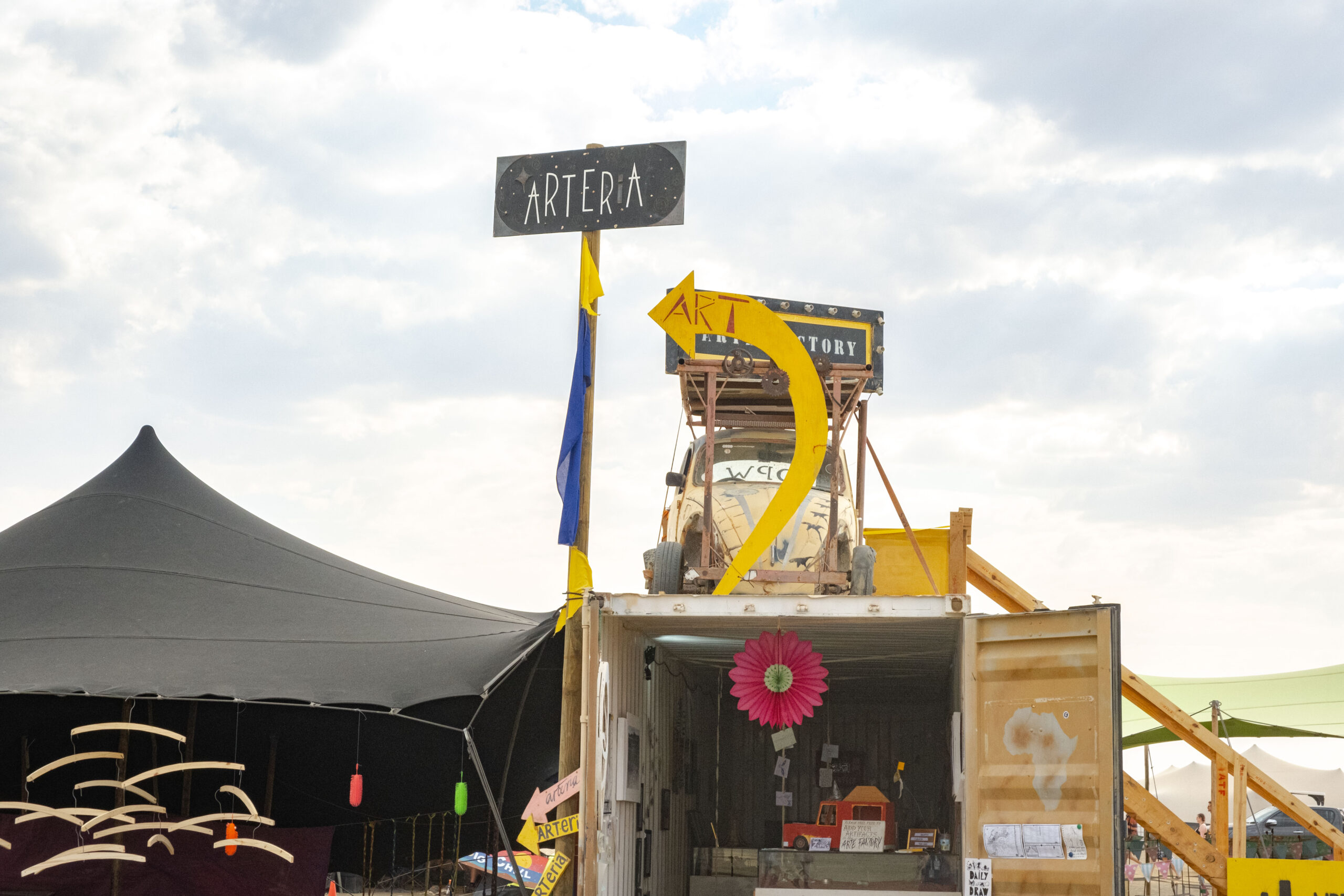
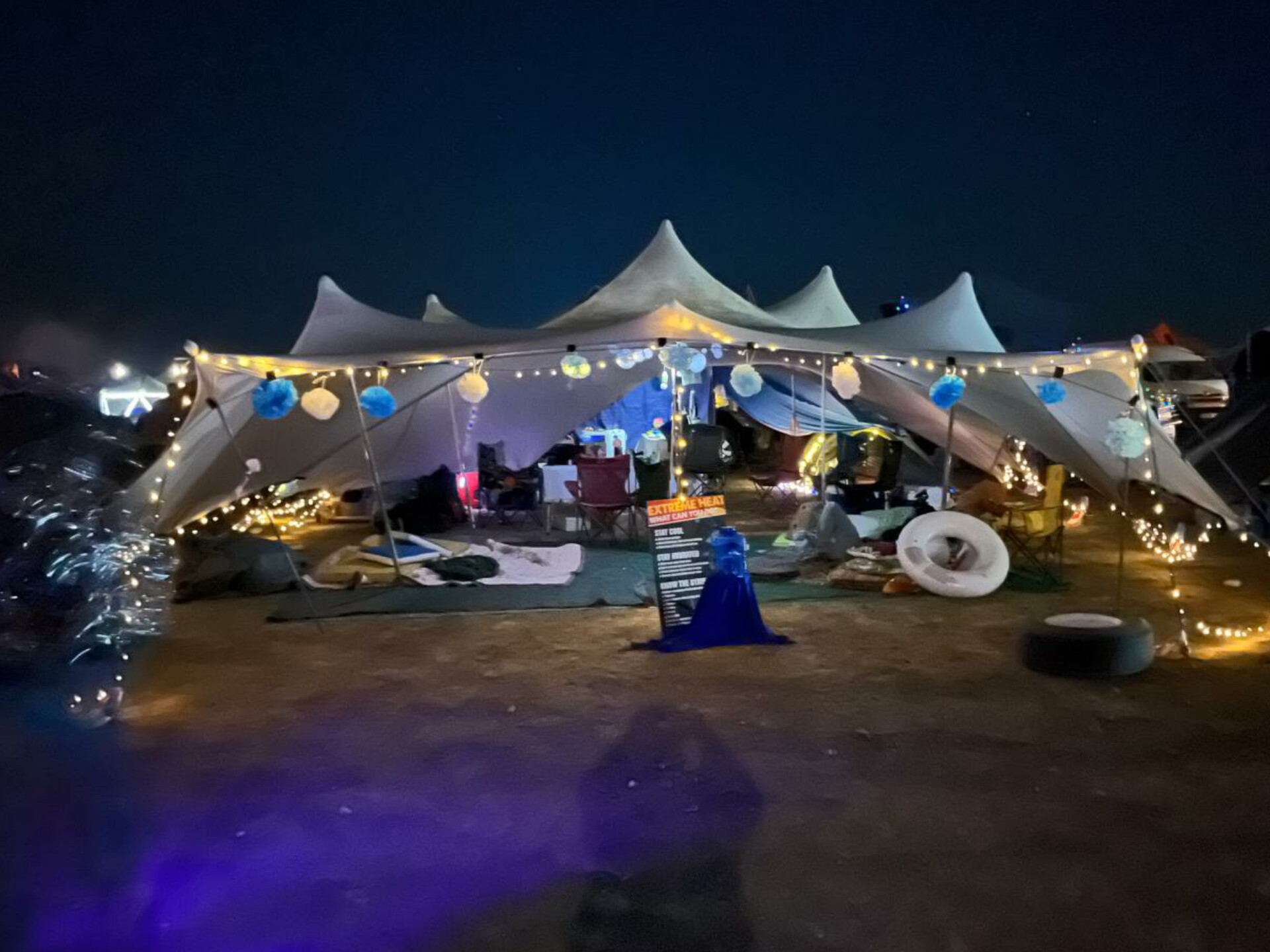
7 Responses
<3
Thank you for coming! Was buruxa to meet most of the team at Arteria. 😉
Toroga, you had me in tears! Thank you for sharing x
This makes me very happy.
We visited your !hara-oms (matjieshuis) and wondered what the story was behind it. One day we say some of the paramedics drive onto the Playa and take pics there….. and wondered why they were so emotional doing it. Thank you for your story and explanation. Next year I will love sitting inside and understanding the significance of the structure, the space, and the community it represents. Thank you for sharing yourself and your heart so freely with us. <3
Please come back next year. There is so much room for more AFRICA at AfrikaBurn and I am grateful you came, felt the beauty and saw the possibilities. Your peoples’ connection to the Karoo landscape is too important to not have a bigger presence. I hope you can & want to be involved in future creation(s) of that space.
I am working for a non-profit organization focusing on gender-based violence in the Western cape